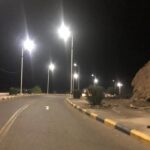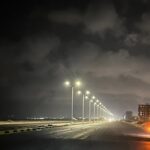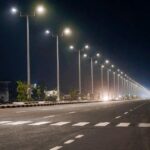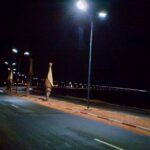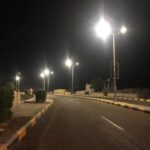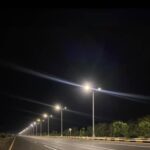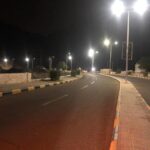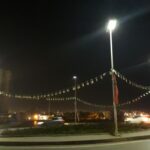With the advancements in solar technology, lighting our compounds and backyards has been made easier. Solar street lights are an efficient and sustainable solutions for illuminating our outdoor spaces. To ensure your solar compound lighting continues to shine brightly and efficiently, it’s essential to follow a set of practical maintenance tips. In this guide, we’ll provide you with nine valuable tips that will help you maintain your solar compound lighting system in optimal working condition.

The signs that your solar compound lighting is not working properly
What are the early signs of a solar light malfunction?
- Dim or flickering light: If your solar street light is producing a dim or flickering light, it may indicate a problem with the battery or solar panel.
- Complete darkness: When the light is not turning on at all, it’s a clear sign of a malfunction.
- Inconsistent Operation: If your solar street light works intermittently or turns on and off randomly.
- Sensor Malfunction: If your solar street light has a motion sensor or light sensor and it doesn’t respond correctly to changes in light or motion.
- Short Battery Life: If the light’s battery doesn’t last as long as it should.
- Corrosion or damage: Physical damage or corrosion on the solar panel, battery, or other components.
Tips to maintain your solar compound lighting solution
What should you do to increase the lifespan of your solar street light?
i. Regular cleaning
One of the primary reasons for cleaning your solar compound lighting setup regularly is to ensure that the solar panels receive maximum sunlight exposure. Solar panels are responsible for converting sunlight into energy, which powers the lights during the night. Dust and dirt can accumulate on the surface of the solar panels over time. Cleaning these panels with a soft cloth or sponge, along with some soapy water, can help remove these particles effectively. Be gentle while cleaning to avoid scratching the panels, which can further reduce their efficiency.
Inspect the light fixtures and the surrounding area for any leaves, branches, or other debris that may have accumulated. These obstructions can cast shadows or block the light, reducing the illumination provided by the solar lights. Regular cleaning also helps maintain the aesthetics of your solar compound lighting. Clean, well-maintained lights not only look better but also contribute to a safer and more welcoming environment.
ii. Check for shades
Shades can be caused by a variety of factors, including overgrown vegetation, debris, or other objects that may cast shadows on your solar panels. It’s essential to inspect your solar compound lighting installation periodically to identify and address any potential shading issues. Look for any objects or obstacles that could obstruct the sunlight, such as tree branches, tall plants, or even nearby structures. Trim any overhanging branches or vegetation that may cast shadows on your solar panels. Additionally, remove any debris or clutter that might accumulate near the lights.
Furthermore, consider the changing seasons and the sun’s position throughout the day. Trees and plants can grow, and their shadows may shift accordingly. Adjust the placement of your solar lights if necessary to ensure they receive maximum sunlight exposure. Proper positioning can make a significant difference in the performance of your solar compound lighting system.
iii. Battery care
It’s crucial to regularly inspect the condition of your batteries. Check for any visible signs of damage or corrosion on the battery terminals and cables. If you notice any issues, address them promptly to prevent further damage. Also try to maintain the appropriate charge and discharge cycles. Solar lights recharge their batteries during the day, and it’s essential to let them discharge completely during the night. This cycle helps prevent overcharging and ensures that the battery remains in good condition.
It’s also essential to protect your batteries from extreme cold temperatures, as cold weather can reduce their efficiency. Consider insulating the battery compartment or moving the batteries indoors during the winter months. Regularly monitor the performance of your solar compound lighting system. If you notice a decrease in brightness or shorter operating times, it may indicate a battery issue. Addressing this promptly can prevent more significant problems in the future.
iv. Clean the light fixture
Over time, dust, dirt, and debris can accumulate on the surface of the solar compound lighting fixture, diminishing its ability to capture and emit light at night. To clean the light fixture, start by turning off the power source, if applicable, to ensure your safety. Next, remove any loose debris or insects that may have settled on the surface. A soft brush or cloth can be used to gently wipe away these contaminants. Be cautious not to scratch or damage the fixture’s surface during this process.
For more stubborn stains or residue, a mixture of mild detergent and water can be applied. Use a soft sponge or cloth to scrub the surface gently. Make sure to rinse thoroughly with clean water to remove any soap residue. Avoid using abrasive materials or harsh chemicals, as they can damage the fixture’s finish and solar panels.
v. Inspect for damage
Start by visually examining each solar light fixture. Look for any visible cracks, dents, or broken components. Pay close attention to the solar panels, as they are essential for capturing sunlight and converting it into energy. Any damage to the panels can significantly affect the performance of your solar compound lighting system. Next, check the wiring and connections of your solar lights. Make sure that all wires are securely connected and free from damage. Damaged wires can lead to electrical issues and may pose safety risks.
Inspect the solar light batteries. Ensure that they are in good condition and free from corrosion. Rechargeable batteries play a crucial role so maintaining their health is vital for the longevity of your lighting system. Don’t forget to examine the light fixtures themselves. Check for any signs of wear and tear, such as rust or fading. Replacing damaged fixtures promptly can enhance the overall appearance of your solar compound lighting.
vi. Adjust placement
Did you consider the direction of sunlight throughout the day? Place your solar lights in areas where they receive maximum sunlight exposure. This ensures that they can absorb sufficient energy to illuminate your compound at night. Additionally, avoid shading your solar lights with tall structures or foliage. Placing them in clear, open areas ensures they are not obstructed by anything that could hinder their ability to charge efficiently. Consider the angle of installation as well. Tilting the solar panels slightly towards the sun’s path can enhance their efficiency.
vii. Replace faulty components
Inspect the batteries used to store the energy generated during the day. Faulty batteries can lead to inadequate energy storage, resulting in reduced lighting performance during the night. Replace any batteries that show signs of deterioration, such as decreased capacity or leakage. Also, check the LED bulbs or fixtures used in your solar compound lighting. LEDs have a longer lifespan compared to traditional incandescent bulbs, but they can still fail over time. If you notice dimming or flickering lights, it’s a clear indication that it’s time to replace the LED bulbs or fixtures.
Examine the wiring and connections of your solar compound lighting system. Corrosion or loose connections can lead to electrical issues, which can affect the overall performance of your lighting. Ensure that all connections are secure and free from damage, replacing any wiring that appears worn or compromised.
viii. Consult the manufacturer’s manual
The manufacturer’s guide serves as a vital reference point for troubleshooting issues and addressing any concerns that may arise with your solar lighting system. It contains detailed explanations of the components, wiring diagrams, and safety precautions, all of which are essential for proper maintenance.
Regularly referring to the manufacturer’s manual enables you to identify potential problems early on, allowing for timely repairs or replacements of faulty components. The manufacturer’s manual also often includes maintenance schedules and tips specific to your solar compound lighting system. These guidelines ensure that you perform routine maintenance tasks, such as cleaning solar panels, checking connections, and inspecting batteries, at the recommended intervals. Always consult the solar street light manufacturer incase you need more help.
ix. Weatherproof connections
Inspect all the connections in your solar compound lighting setup. This includes the connections between solar panels, batteries, and light fixtures. Ensure that all electrical connections are secure and properly sealed. Loose or exposed wires can lead to electrical issues and corrosion over time.
One of the most effective ways to weatherproof connections is by using waterproof connectors and junction boxes. These components are designed to keep moisture, dust, and debris out, preventing them from infiltrating your system and causing damage. Additionally, applying a layer of silicone sealant around the connections can provide an extra layer of protection. This sealant acts as a barrier against water and moisture, reducing the risk of corrosion and electrical shorts.
Conclusion
Do you prefer waiting until your solar compound lighting system is damaged? Taking proactive steps to maintain your solar light ensures its longevity and guarantees consistent performance. All of the above tips are crucial to maintain your solar system. Do you need more detailed tips? Contact us.






